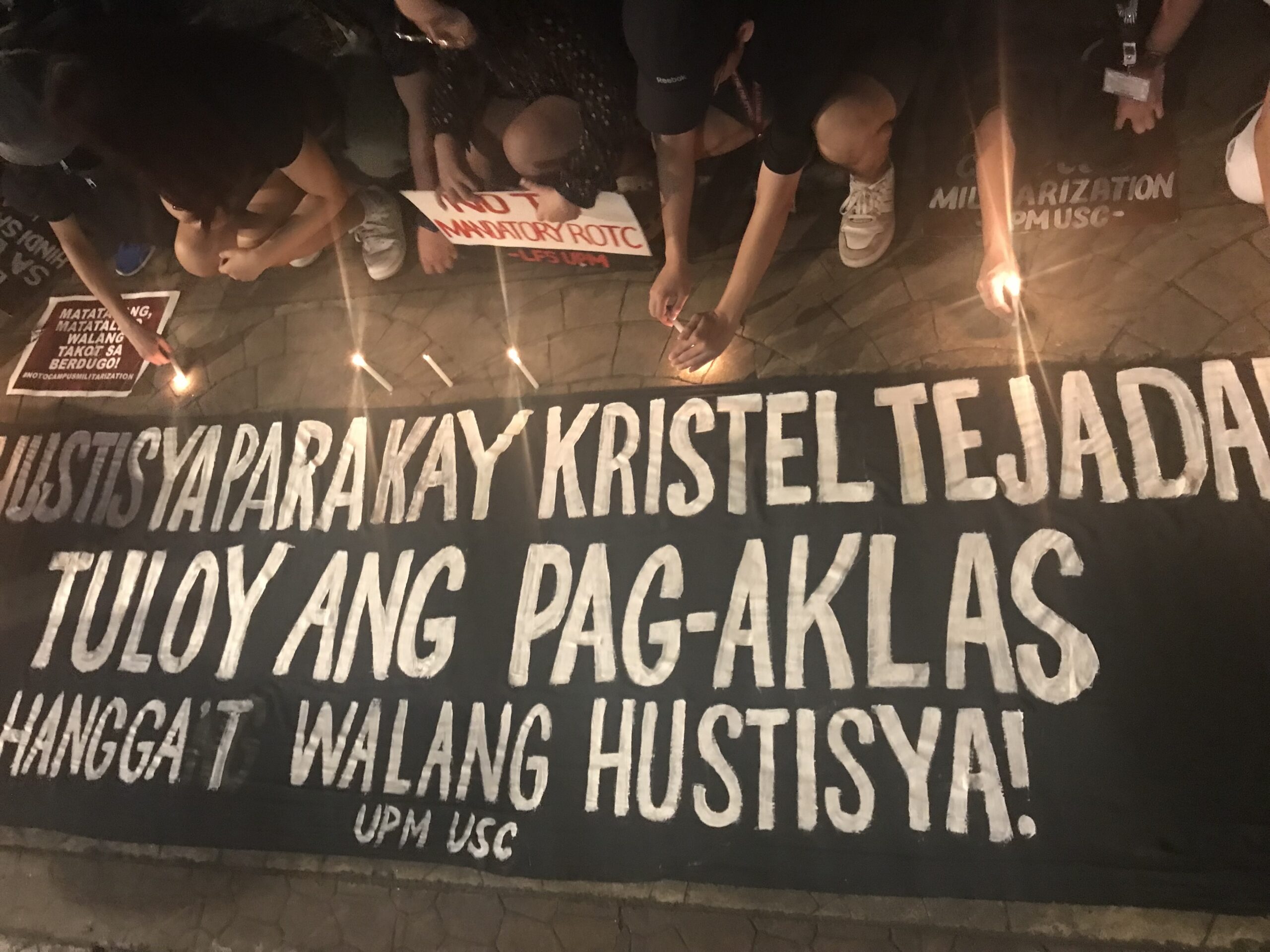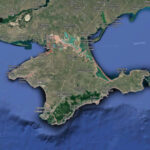16-year-old Kristel Tejada aspired to become a doctor, noting that education was her family’s only treasure. She was a Behavioral Science student at UP Manila.
In 2013, she wrote a letter seeking support to sustain her education following the economic woes her family endured. Tejada mentioned that her family depended solely on her father’s income as a part-time taxi driver.
However, she was forced to take a leave of absence and surrender her ID due to her inability to pay the P10,000 tuition. One day, she took her own life by drinking silver cleaner.
For 11 years, various students have observed March 15 as the day to remember and demand justice for the tragic death of Tejada, a fellow Iskolar ng Bayan and a victim of the commercialized and repressive education system in the Philippines.
Kristel’s struggle continues to resonate

“Hindi lang suicide ang nangyari kay Kristel kundi isang murder. Pinatay siya ng parehong sistemang dapat ay kumakalinga at humuhubog sa kanya. At katulad niya, ang mga estudyante ngayon ay binibigo ng nakamamatay na sistema,” said National Union of Students of the Philippines National Capital Region (NUSP – NCR) regional coordinator Rebecca Baliton.
[Not only suicide happened to Kristel but also a murder. She was killed by the same system that should have been nurturing and shaping her. And like her, students today are being failed by a deadly system]
Baliton said the UP Manila administration has only been coming clean since the Tejada case, especially during the time of late chancellor Manuel Agulto.
She further lambasted the continuing commercialization among schools even after the enactment of the Republic Act 10931 or the Universal Access to Quality Tertiary Education Act (simply referred to as the Free Tuition Law) in 2017.
“Nariyan na nga ang free tuition law pero samu’t saring bayarin pa rin ang naisisingit nilang ipataw sa mga estudyante. May mga requirements na babayaran nang malaki na pinapa-shoulder sa mga estudyante. Ang napakataas na gastos sa pamasahe, tirahan, pagkain, at iba pa,” said Baliton.
[The free tuition law is already in place, but they still impose various fees on students. There are requirements that entail hefty payments burdened upon the students. The expenses for transportation, accommodation, food, and others are excessively high]
In 2022, Commission on Higher Education (CHED) Chairperson Prospero de Vera III reported that the program benefited more than two million students since Academic Year (AY) 2018-2019 up until AY 2021-2022. Of the number, 1.97 million students across 220 higher education institutions did not have to pay their tuition.
However, some students are no longer covered in the program following the implementing rules and regulations (IRR) which were approved in 2018.
“Nakakalungkot kasi umasa kami noong 3rd year kami (sa undergraduate) na aabutan ang free tuition sa medical school. Nangyari kasi dati, parang 2 or 3 years nagkaroon ng free tuition sa SUCs pero naubos na raw ang budget for that,” said UP Manila student Alec Miranda.
[It’s saddening because we hoped during our third year in undergraduate studies to benefit from free tuition in medical school. It happened before, about 2 or 3 years ago, there was free tuition in State Universities and Colleges (SUCs) but the budget for that has been depleted]
Miranda finished his nursing degree in 2023. He then enrolled in Medicine Proper, which is a five-year study of basic and clinical sciences, humanities and internship in the university.
In UP Manila, students qualified under Integrated Liberal Arts and Medicine (INTARMED) program are covered in the free tuition law. INTARMED is a special program that shortens the whole medical education by two years.
In 2017, the CHED and the Department of Budget Management issued an allocation of P317.1 million to provide free tuition for medical students in eight state universities and colleges including UP Manila.
It is said that students can avail the free tuition subsidy through Cash Grants to Medical Students Enrolled in State Universities and Colleges (CGMS-SUCs) program.
However, the CGMS-SUCs program only lasted until AY 2019-2020 following the slashed budget to CHED in 2020. It can also be seen a decline of budget to the said program ever since its implementation.
| Academic Year | Budget for CGMS-SUCs | |
| AY 2017-2018 | P317.1 million | |
| AY 2018-2019 | P250 million | -67.1 million or 21.16% cut |
| AY 2019-2020 | P167 million | -83 million or 33.2 cut |
The same year following CGMS-SUCs discontinuance, Sen. Ralph Recto filed Senate Bill No. 1130 seeking to amend the free tuition law by including the provision of tuition subsidy to qualified medical students in SUCs.
“Pagkapasok ko ng Lateral Unit 3 (LU III), 1st year medical school, parang nasa around P51,000 ang babayaran per semester. We have an option to apply for a discount, 33% ang baseline na ibinibigay under socialized tuition scheme (STS),” Miranda shared.
[When I entered Lateral Unit 3 (LU III), the first year of medical school, the fee to be paid per semester was around P51,000. We have the option to apply for a discount, with a baseline of 33% given under the socialized tuition scheme (STS)]
The STS is also where Tejada was included in bracket D. Her family believed she should be in bracket E2 to avail free tuition and would even receive a stipend of P2,400 per month or P12,000 per semester.
STS was formerly known as the Socialized Tuition and Financial Assistance Program (STFAP) which was implemented in 1989.
Under the STS, student’s default tuition is set at P1,500 per unit unless they apply for lower-paying bracket by proving their poverty in order to get a discount. This means those who fall under Bracket A pay P1,500 per unit; Bracket B students pay P1,000; Bracket C, P600, and Bracket D, P300. Students under Bracket E are exempted from tuition.
Miranda further shared that there are three options for medical students to avail free tuition or discount: it can be through scholarships, STS or Medical Scholar Return Service (MSRS).
After the discontinuation of CGMS-SUCs program, CHED administered MSRS under the “Doktor Para sa Bayan” [Doctor for the Nation] Law; however this time, students will have to take a mandatory return service in exchange of a tuition subsidy.
“Isang represibo na polisiya itong MSRS na magbibigay ng return service over pa doon sa return service na ibibigay mo sa college mo,” Miranda stressed.
[The MSRS (Medical Scholar Return Service) is a restrictive policy that imposes additional return service beyond what you commit to your college]
Six out of seven colleges or the “white colleges” and four extension schools in School of Health Sciences in UP Manila must undergo Return Service Agreement (RSA) as an “absolute admission requirement” since its implementation in 2011.
With RSA in effect, students with 60 units enrolled in the university must stay and work in the country for a minimum of two years. Those who breach the contract due to being unable to complete the return service program must render payment as an option.
The agreement also caused some to remain in their degree programs despite failing or lacking interest, to enroll less than the regular load per semester to avoid reaching the 60 units limit, or drop out of school completely.
For Miranda, he shared that he has yet to render his return service in his nursing undergraduate.
“Sa original return service contract na pinirmahan, pwede siyang maging add-ons. Pwedeng i-serve as a doctor, in the future namin ito iseserve,” Miranda said.
[In the original return service contract we signed, additional duties can be included. It can be served as a doctor, which we plan to reserve for the future]
The problem is, according to Miranda, his undergrad college would push them to serve their return service duty as nurses.
“Marami siyang problemang kasama kasi pipigilan nito kaming magtrabaho bilang doktor, matatagalan ang training namin bilang doktor. Isa pa, patient safety. By that time, nakalimutan na siguro namin yong mga responsibilities na gawin bilang nurses dahil 5 years kaming nag-aral bilang doktor,” Miranda lamented.
[It comes with many issues because it hinders us from working as doctors, prolonging our training as doctors. Additionally, there’s the concern for patient safety. By that time, perhaps we have forgotten our responsibilities as nurses because we spent five years studying to become doctors]
Miranda shared there are 201 students enrolled in his batch, of which majority availed STS.
“Nakakalungkot kasi hanggang ngayon mayroon pa ring tuition knowing na state college ito. Sa personal na karanasan, hindi pa ako bayad sa tuition kahit mayroon akong discount kasi malaking bawas siya sa kabuhayan. ‘Yong P51,000 na iyon kahit nabawasan na ito at naging P30,000; na kahit P30,000 iyon at mura rito sa UP ay malaking bawas iyon sa pang-araw araw pa naming panggastos,” he said.
[It’s saddening because up to now, there’s still tuition fees despite it being a state college. From my personal experience, I haven’t paid my tuition yet even with the discount because it significantly affects our livelihood. That P51,000, even if it’s reduced to P30,000, even though it’s relatively affordable here in UP, is still a substantial deduction from our daily expenses]
In a Philippine Collegian report, one out of 10 students in UP Diliman are ineligible for the tuition free law.
This year, P36.7 billion fund is allocated to CHED with P23.4 billion allocation to Tertiary Education Subsidy and P5.5 for Free Higher Education.
Under the 2024 General Appropriations Act (GAA), the UP System is allotted 24.7 billion, or a P508-million increase from last year’s budget at P24.263 billion. NUSP NCR said such increase is a minimum victory after the heated deliberation in Congress following the Vice President Sara Duterte’s confidential and intelligence fund (CIF) fiasco.
Charter change will worsen the education system

Baliton further decried that students have since been subjected to academic repression due to commercialization driven by a colonial mentality basing on standards of international or global competencies.
“Pinagkocompete tayo ng kasalukuyang tipo ng ating edukasyon sa isa’t isa. Napakamapanghati ng ating edukasyon na tinutulak tayo nito para tingnan ang kapwa estudyante natin bilang kompetensya sa halip na katuwang sa pagpapaunlad ng bansa,” Baliton stressed.
[The current type of education pushes us to compete against each other. Our education system is so divisive that it encourages us to see our fellow students as competitors rather than partners in the development of the country]
“Ang lahat ng ito ay ilang ulit pang lalala sa ilalim ng charter change ni Marcos Jr! Lantaran na nilang hahayaang magnakaw ang mga dayuhan mula sa ating mga likas na yaman at pangasiwaan ang ating mga institustyong pang-edukasyon para tuluyan na tayong papasukuin sa interes nila,” she added.
[All of these will worsen under Marcos Jr.’s charter change! They will blatantly allow foreigners to plunder our natural resources and control our educational institutions to completely subjugate us to their interests]
Educational institutions would be affected in the proposed economic provisions for the 1987 Constitution. According to Baliton, this will further open schools to intensified repression in forms of campus militarization, railroading of Mandatory ROTC, tuition hikes, budget cuts among others.


“Sa pag-alala natin sa pagpanaw ni Kristel, huwag nating hayaang maapula ang apoy ng ating galit sa sistema. Bagkos ay hayaan pa natin itong magliyab upang bigyang lakas ang ating panawagan para sa hustisya. Patuloy nating ipaglalaban ang isang makabansa, siyentipiko, at maka-masang edukasyon,” said Baliton.
[In remembering Kristel’s passing, let us not allow the fire of our anger toward the system to be extinguished. Instead, let us allow it to blaze even brighter to strengthen our call for justice. Let us continue to fight for a national, scientific, and mass-oriented education]
The House deliberations on Resolution of Both House 7 will convene for its third and final hearing on March 20.



